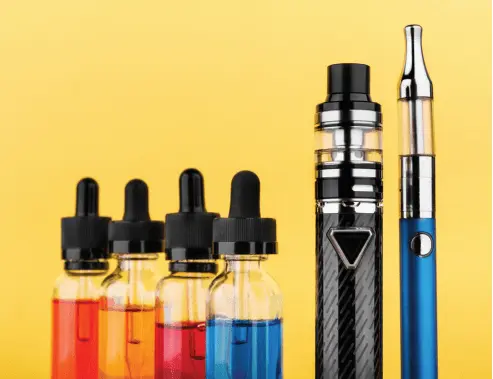The word “vaping” refers to the act of inhaling the vapor produced by an electronic cigarette (e-cigarette) or other vaping device. E-cigarettes heat a liquid (called e-liquid) that can contain nicotine, tetrahydrocannabinol (THC) or cannabidiol (CBD) oils, as well as flavoring agents and chemicals used to help produce the aerosol. E-cigarettes come in many sizes, shapes and configurations such as pens, tank models, pods, sticks and other devices.

What are the known oral health effects of vaping?
While the aerosol produced by e-cigarettes contains fewer toxic chemicals than regular cigarette smoke, it does still contain harmful and potentially harmful substances. Inhaling the heated vapor causes drying of the mouth, which can lead to caries and other bacterial changes. Each variety of e-liquid can contain different products and flavorings, and many e-liquid product labels don’t list all of the substances they contain, making it hard for scientists and consumers alike to know what may or may not be harmful.
Here are some of the known harmful ingredients in e-liquid products and how they may affect you.
Nicotine is by far the most commonly desired product in e-liquid products. Nicotine can stick to tooth enamel, staining teeth and making it easier for plaque to accumulate. It can also lead to a much higher chance of developing gum disease and tooth loss. Some e-cigarette manufacturers do not even disclose that they contain nicotine; e-cigarettes marketed to contain 0% nicotine have been found to contain nicotine.
THC and CBD are both popular alternatives to nicotinebased e-liquid. THC is the main psychoactive compound in the cannabis plant, and CBD is a nonpsychoactive cannabinoid also found in cannabis. Not much research is available on the health effects of vaping products that contain these ingredients; however, there have been several cases of lung injury and hospitalization linked to them.
Flavorings are a major selling point for individual varieties of e-liquid. It’s important to look at each flavoring and remember that a product may be considered safe to ingest but not safe to inhale. For example, diacetyl — a butterflavored chemical used in many common foods and found in popular e-liquid flavors such as vanilla, maple and coconut — has been linked to a serious chronic lung disease with symptoms similar to chronic obstructive pulmonary disease when inhaled.
E-liquid products have also been found to contain heavy metals such as lead, nickel, chromium and manganese at levels that exceed safe limits for inhalation as well as volatile organic compounds such as benzene.
Do I need to tell my dentist if I use e-cigarettes?
It’s important to let your dentist know about any vaping or e-cigarette use, even if the patient history form only asks about traditional tobacco use. Also talk to your dentist about whether you have any symptoms of dry mouth. Knowing about your e-cigarette use will help your dentist identify and monitor any effects on your oral health and help keep you healthy while the science catches up to this trend.
In 2019, the CDC issued a public health warning regarding e-cigarettes containing THC and also confirmed several deaths. For the latest information, refer to cdc.gov.
© COPYRIGHT 2020 BY THE ACADEMY OF GENERAL DENTISTRY. ALL RIGHTS RESERVED.